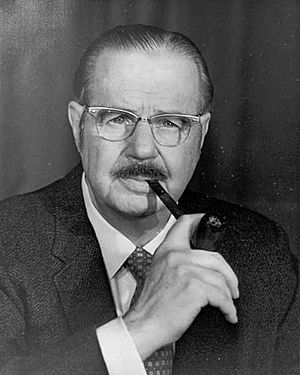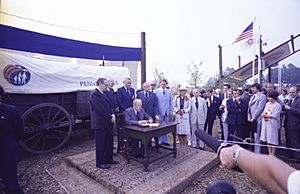Hugh Scott facts for kids
Quick facts for kids
Hugh Scott
|
|
|---|---|
 |
|
| Senate Minority Leader | |
| In office September 24, 1969 – January 3, 1977 Acting: September 5 – September 24, 1969 |
|
| Deputy | Robert P. Griffin |
| Preceded by | Everett Dirksen |
| Succeeded by | Howard Baker |
| Leader of the Senate Republican Conference | |
| In office September 24, 1969 – January 3, 1977 |
|
| Deputy | Robert P. Griffin |
| Preceded by | Everett Dirksen |
| Succeeded by | Howard Baker |
| Senate Minority Whip | |
| In office January 3, 1969 – September 6, 1969 |
|
| Leader | Everett Dirksen |
| Preceded by | Thomas Kuchel |
| Succeeded by | Robert P. Griffin |
| United States Senator from Pennsylvania |
|
| In office January 3, 1959 – January 3, 1977 |
|
| Preceded by | Edward Martin |
| Succeeded by | John Heinz |
| Chair of the Republican National Committee | |
| In office June 27, 1948 – August 5, 1949 |
|
| Preceded by | B. Carroll Reece |
| Succeeded by | Guy Gabrielson |
| Member of the U.S. House of Representatives from Pennsylvania |
|
| In office January 3, 1941 – January 3, 1945 |
|
| Preceded by | George P. Darrow |
| Succeeded by | James Wolfenden |
| In office January 3, 1947 – January 3, 1959 |
|
| Preceded by | Herbert J. McGlinchey |
| Succeeded by | Herman Toll |
| Constituency | 7th district (1941–1945) 6th district (1947–1959) |
| Personal details | |
| Born | November 11, 1900 Fredericksburg, Virginia, U.S. |
| Died | July 21, 1994 (aged 93) Falls Church, Virginia, U.S. |
| Resting place | Arlington National Cemetery |
| Political party | Republican |
| Spouse |
Marian Huntington Chase
(m. 1924; died 1987) |
| Children | 1 |
| Parents |
|
| Alma mater | Randolph–Macon College (BA) University of Virginia (LLB) |
| Occupation |
|
| Military service | |
| Allegiance | United States |
| Branch | United States Army United States Navy Reserve |
| Years of service | 1917–1918 (Army) 1940–1946 (Navy) |
| Rank | Cadet (Army) Commander (Navy) |
| Conflict | World War I World War II |
Hugh Doggett Scott Jr. (born November 11, 1900 – died July 21, 1994) was an American politician. He was a member of the Republican Party. Scott represented Pennsylvania in the U.S. House of Representatives from 1947 to 1959. He also served in the U.S. Senate from 1959 to 1977. From 1969 to 1977, he was the Senate Minority Leader.
Scott was born and educated in Virginia. He later moved to Philadelphia to work at his uncle's law firm. In 1926, he became Philadelphia's assistant district attorney, serving until 1941. Scott was elected to the House of Representatives in 1940. He lost his seat in 1944 but won it back in 1946. He served in the House until 1959.
He was known as an internationalist and a moderate Republican. After helping Thomas E. Dewey get the Republican presidential nomination in 1948, Scott became Chairman of the Republican National Committee. He also led Dwight Eisenhower's campaign in the 1952 presidential election.
In 1958, Scott was elected to the Senate. He strongly supported civil rights laws. He voted for the Civil Rights Acts of 1957, 1960, 1964, and 1968. He also supported the 24th Amendment and the Voting Rights Act of 1965. In 1969, he became Senate Minority Whip. Later that year, he became Senate Minority Leader after Everett Dirksen passed away. As the Republican leader, Scott asked President Richard Nixon to resign during the Watergate Scandal. Scott chose not to run for re-election in 1976 and retired in 1977.
Early Life and Education
Hugh Doggett Scott Jr. was born on November 11, 1900. His family lived on an estate in Fredericksburg, Virginia. This estate was once owned by George Washington. Scott's grandfather fought in the Confederate Army during the Civil War. His great-grandmother was related to President Zachary Taylor.
Scott went to public schools in Fredericksburg. In 1919, he graduated from Randolph–Macon College in Ashland, Virginia. During World War I, he joined the Student Reserve Officers Training Corps. This program trained college students to become military officers.
In 1922, Scott earned his law degree from the University of Virginia School of Law. He was part of the Jefferson Literary and Debating Society. He became interested in politics by watching hearings at the Virginia House of Delegates.
Start in Politics
Scott became a lawyer in 1922. He moved to Philadelphia, Pennsylvania, and joined his uncle's law firm. In 1924, he married Marian Huntington Chase. They had one daughter, Marian. Marian passed away in 1987.
Scott was very active in the Republican Party. In 1926, he was appointed assistant district attorney of Philadelphia. He worked in this role until 1941. He said he handled over 20,000 cases during this time.
In 1940, Scott was elected to the U.S. House of Representatives. He represented Pennsylvania's 7th congressional district in Northwest Philadelphia. He won against Democratic candidate Gilbert Cassidy. In 1942, he was re-elected for a second term.
In 1944, Scott lost his re-election bid to Democrat Herb McGlinchey. The difference was only 2,329 votes.
Scott joined the United States Navy Reserve in 1940. He served during World War II. He was stationed in Iceland and on the USS New Mexico. He was among the first U.S. forces to enter Japan after the war. He left the Navy with the rank of commander.
In 1946, Scott won back his House seat. He defeated McGlinchey by a large number of votes. He spoke out against President Franklin Roosevelt's actions and against communists in Washington, DC. He was re-elected five more times. He served in the House until he won election to the U.S. Senate.
Serving in the Senate

In 1958, Scott was elected to the U.S. Senate. He won against Governor George M. Leader. Scott continued his progressive views in the Senate. He opposed President Eisenhower's vetoes on housing and redevelopment bills. He voted to end a filibuster on the Civil Rights Act of 1960. He also sponsored bills to support the Civil Rights Commission.
In 1962, Scott considered running for Governor of Pennsylvania. He wanted the Republican Party to nominate a moderate candidate, William W. Scranton. Scott also supported Scranton over Barry Goldwater for the Republican nomination in the 1964 presidential election.
Scott was re-elected to the Senate in 1964. He won despite a national trend favoring Democratic President Lyndon Johnson. He defeated Democrat Genevieve Blatt.
Scott voted for the Civil Rights Act of 1964, the Voting Rights Act of 1965, and the Civil Rights Act of 1968. In 1966, he and other Republican lawmakers sent a telegram to Georgia Governor Carl Sanders. They protested the Georgia legislature's refusal to seat Julian Bond. They said it was "a dangerous attack on representative government."
Scott supported Nelson Rockefeller for the Republican nomination in the 1968 presidential election. Scott was re-elected again in 1970. He defeated State Senator William Sesler.
Scott became Senate Minority Whip in January 1969. On September 5, 1969, he became acting minority leader. This was because the current leader, Everett Dirksen, was ill. Dirksen passed away two days later. On September 24, Scott was elected Senate Minority Leader. He served until 1977.
Scott was not happy with the Nixon administration. He felt they did not include him enough in policy decisions. He helped with the change from the Nixon administration to the Ford administration. He asked Gerald Ford if he could still call him "Jerry" after Ford became President.
On August 7, 1974, Scott was one of three Republican leaders who met with President Richard Nixon. They told Nixon that he had lost support from his party in Congress. This meeting happened the day before Nixon announced his resignation from the presidency. Scott and Senator Goldwater told Nixon that very few Senators would vote to keep him in office.
Scott did not run for re-election in 1976. He was succeeded by Republican John Heinz. In the same year, he led the Pennsylvania group at the 1976 Republican National Convention.
Later Years
Hugh Scott lived in Washington, D.C., and later in Falls Church, Virginia. He passed away in Falls Church in 1994. He is buried at Arlington National Cemetery. His important papers are kept at the Albert and Shirley Small Special Collections Library at the University of Virginia.
 | Sharif Bey |
 | Hale Woodruff |
 | Richmond Barthé |
 | Purvis Young |

